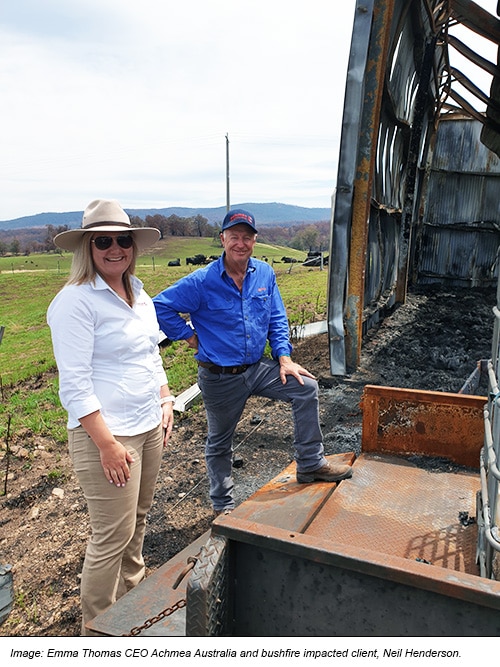
Editorial by Emma Thomas, Chief Executive Officer, Achmea Australia, Australia’s specialist farm insurer
I was born and raised in New Zealand, and now as the CEO of Achmea Australia, a specialist farm insurer, I remain proudly guided by a Maori proverb from my culture:
He aha te mea nui o te ao
What is the most important thing in the world?
He tangata, he tangata, he tangata
It is the people, it is the people, it is the people
For us, at Achmea Australia, the people are our employees, our clients and our communities – they are fundamental to what we do.
Our employees work alongside our clients to actively support greater risk awareness and risk mitigation measures and when something unexpected happens, we support our clients to rebuild their livelihoods.
Whether it is due to a housefire or a major catastrophe; when someone has just lost everything, our Claims Team and Farm Insurance Specialists are often the first point of call after something happens.
That is why, due to the nature of our work, we continually work to ensure that the mental health and well-being of our people is at the forefront of our approach.
I was recently invited to participate in a panel discussion as part of the 2021 virtual Women in Insurance Summit, organised by Insurance Business Australia about mental health strategies in the workplace, and I reflected on the catastrophic bushfire season in 2019-20.
Shortly after the fires, our teams started to get the first calls from clients across Australia; many of whom were emotionally and physically exhausted from what had been a very traumatic, exhausting, and anxious bushfire season. We had not seen devastation on a scale like this.
When it was safe to do so, I travelled through bushfire-ravaged agricultural communities in Victoria, together with our local Farm Insurance Specialists, to meet with some of our impacted clients. We saw first-hand the sheer devastation. The image of charred woolen socks hanging on a clothesline at a family farm will stay with me forever; it was the only thing that remained when everything else was completely destroyed.
Our first move was not to check insurance policies, but to check in with our farmers. We took the time to walk through their bushfire-ravaged properties. During our walk, they started to share their thoughts and their feelings, and emotions came flooding out. By us taking the time to ask how they were doing, gave them the strength to talk about what had happened.
It took me back to an experience in New Zealand when colleagues and I were visiting impacted farmers in a remote area after a major earthquake. Before we left town, it was recommended we take bread as that was what people “needed”.
We arrived on-farm to a chaotic scene; we immediately forgot about the bread that we had picked up on the way.
I asked the farmer how he was. He paused and thanked me for asking, saying other organisations “had simply dropped off bread and left again”.
The simple act of checking-in has become more important than ever, for both our employees and our clients.
Today on R U OK? Day and every day, we are focused on mental health awareness, openly sharing stories and normalising conversations around these topics to remove the stigma. What flows from there is recognition, empathy and support. After all, we stand stronger together.
The conversations we have with ourselves and each other today, will help us to support each other’s resilience, and ultimately enable a more resilient future for our people; our employees, clients, and communities.
Chances are we all know someone who might be struggling, and by showing them that we are genuinely there to listen, whatever they are facing, big or small, we can truly make a difference.
Just like the farmer impacted by the earthquake in New Zealand, usually, it is not the bread they need.
The question ‘R U OK?’ could be in fact, what they truly need.
If you are upset by any content in this article, or if you or a loved one need support, the following services are available to support you:
- For crisis support, contact Lifeline on 13 11 14.
- For phone-based support contact Beyond Blue on 1300 224 636.
- Kids Helpline: 1800 55 1800.
- 1800Respect National Sexual Assault, Domestic Family Violence Counselling Service: 1800 737 732.
- For situations that are harmful or life-threatening, contact emergency services immediately on Triple Zero (000).

